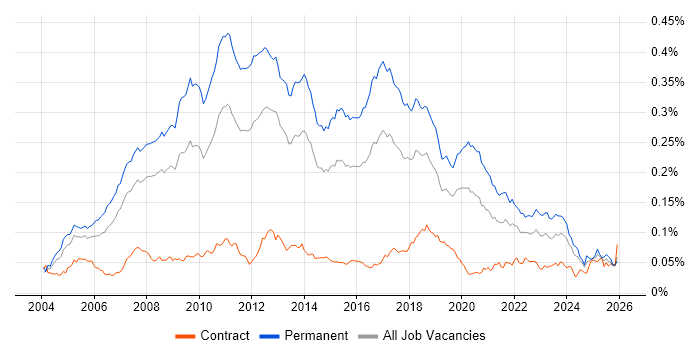Lead .NET Developer
UK
The median Lead .NET Developer daily rate in the UK is £500, according to job vacancies posted in the 6 months leading up to 12 May 2025.
The table below provides contractor rate benchmarking and summary statistics, comparing them to the same period in the previous two years.
| 6 months to 12 May 2025 |
Same period 2024 | Same period 2023 | |
|---|---|---|---|
| Rank | 508 | 573 | 675 |
| Rank change year-on-year | +65 | +102 | +130 |
| Contract jobs requiring a Lead .NET Developer | 18 | 17 | 24 |
| As % of all contract jobs advertised in the UK | 0.062% | 0.040% | 0.042% |
| As % of the Job Titles category | 0.067% | 0.043% | 0.044% |
| Number of daily rates quoted | 13 | 12 | 14 |
| 10th Percentile | £460 | £364 | £510 |
| 25th Percentile | - | £394 | £520 |
| Median daily rate (50th Percentile) | £500 | £450 | £576 |
| Median % change year-on-year | +11.11% | -21.91% | +4.77% |
| 75th Percentile | £668 | £528 | £692 |
| 90th Percentile | £672 | £684 | £717 |
| UK excluding London median daily rate | £655 | £465 | £510 |
| % change year-on-year | +40.86% | -8.82% | +2.00% |
All Contract IT Job Vacancies
UK
For comparison with the information above, the following table provides summary statistics for all contract IT job vacancies. Most job vacancies include a discernible job title that can be normalized. As such, the figures in the second row provide an indication of the number of contract jobs in our overall sample.
| Contract vacancies in the UK with a recognized job title | 27,042 | 39,900 | 54,705 |
| % of contract IT jobs with a recognized job title | 92.44% | 92.78% | 94.63% |
| Number of daily rates quoted | 17,611 | 25,963 | 38,196 |
| 10th Percentile | £300 | £280 | £313 |
| 25th Percentile | £406 | £410 | £425 |
| Median daily rate (50th Percentile) | £513 | £525 | £540 |
| Median % change year-on-year | -2.38% | -2.78% | +2.86% |
| 75th Percentile | £625 | £638 | £650 |
| 90th Percentile | £738 | £750 | £750 |
| UK excluding London median daily rate | £475 | £490 | £500 |
| % change year-on-year | -3.06% | -2.00% | +5.26% |
| Number of hourly rates quoted | 1,049 | 2,673 | 1,532 |
| 10th Percentile | £14.00 | £12.86 | £14.25 |
| 25th Percentile | £18.22 | £16.30 | £19.06 |
| Median hourly rate | £28.60 | £37.50 | £45.00 |
| Median % change year-on-year | -23.73% | -16.67% | +88.21% |
| 75th Percentile | £62.50 | £61.30 | £65.75 |
| 90th Percentile | £75.00 | £72.90 | £76.00 |
| UK excluding London median hourly rate | £27.50 | £40.00 | £42.43 |
| % change year-on-year | -31.25% | -5.73% | +112.16% |
Lead .NET Developer
Job Vacancy Trend
Job postings that featured Lead .NET Developer in the job title as a proportion of all IT jobs advertised.

Lead .NET Developer
Contractor Daily Rate Trend
3-month moving average daily rate quoted in jobs citing Lead .NET Developer.
Lead .NET Developer
Daily Rate Histogram
Daily rate distribution for jobs citing Lead .NET Developer over the 6 months to 12 May 2025.
Lead .NET Developer
Contractor Hourly Rate Trend
3-month moving average hourly rates quoted in jobs citing Lead .NET Developer.
Lead .NET Developer
Top 7 Contract Locations
The table below looks at the demand and provides a guide to the median contractor rates quoted in IT jobs citing Lead .NET Developer within the UK over the 6 months to 12 May 2025. The 'Rank Change' column provides an indication of the change in demand within each location based on the same 6 month period last year.
| Location | Rank Change on Same Period Last Year |
Matching Contract IT Job Ads |
Median Daily Rate Past 6 Months |
Median Daily Rate % Change on Same Period Last Year |
Live Jobs |
|---|---|---|---|---|---|
| England | +67 | 12 | £655 | +51.45% | 26 |
| Work from Home | +50 | 11 | £500 | +11.11% | 19 |
| London | +36 | 9 | £581 | +50.00% | 7 |
| UK excluding London | +45 | 3 | £655 | +40.86% | 21 |
| South West | +43 | 2 | £740 | - | 2 |
| East Midlands | - | 1 | £500 | - | |
| Midlands | - | 1 | £500 | - |
Lead .NET Developer Skill Set
Top 30 Co-occurring Skills and Capabilities
For the 6 months to 12 May 2025, Lead .NET Developer contract job roles required the following skills and capabilities in order of popularity. The figures indicate the absolute number co-occurrences and as a proportion of all contract job ads featuring Lead .NET Developer in the job title.
|
|
Lead .NET Developer Skill Set
Co-occurring Skills and Capabilities by Category
The follow tables expand on the table above by listing co-occurrences grouped by category. The same employment type, locality and period is covered with up to 20 co-occurrences shown in each of the following categories:
|
|
||||||||||||||||||||||||||||||||||||||||||||||||||||||||||||||||||||||||||||||||||||
|
|
||||||||||||||||||||||||||||||||||||||||||||||||||||||||||||||||||||||||||||||||||||
|
|
||||||||||||||||||||||||||||||||||||||||||||||||||||||||||||||||||||||||||||||||||||
|
|
||||||||||||||||||||||||||||||||||||||||||||||||||||||||||||||||||||||||||||||||||||
|
|
||||||||||||||||||||||||||||||||||||||||||||||||||||||||||||||||||||||||||||||||||||
|
|
||||||||||||||||||||||||||||||||||||||||||||||||||||||||||||||||||||||||||||||||||||
|
|
||||||||||||||||||||||||||||||||||||||||||||||||||||||||||||||||||||||||||||||||||||
